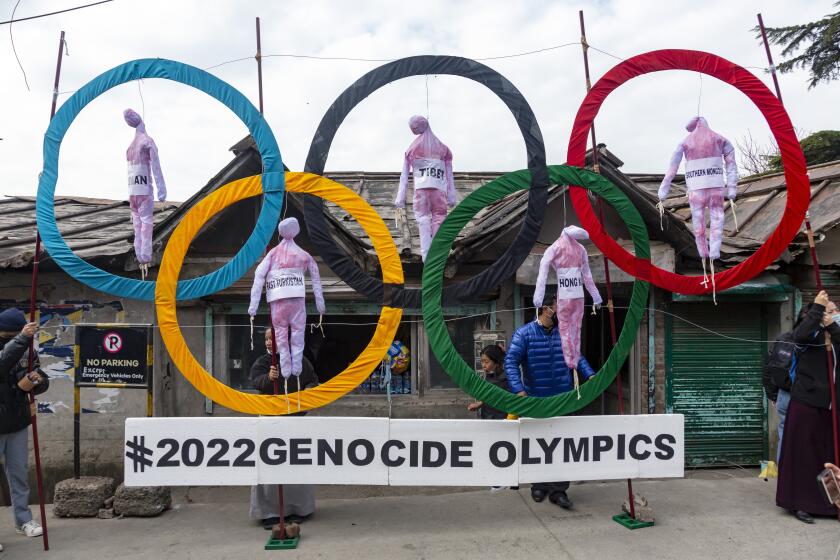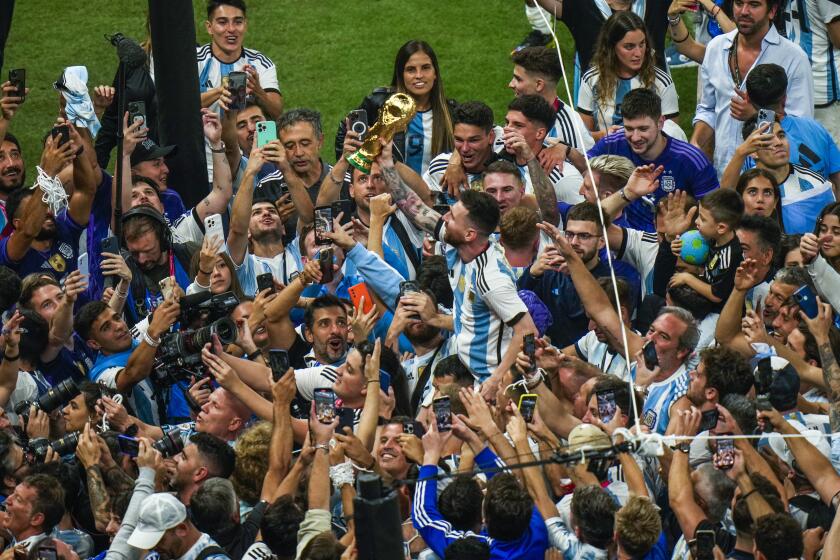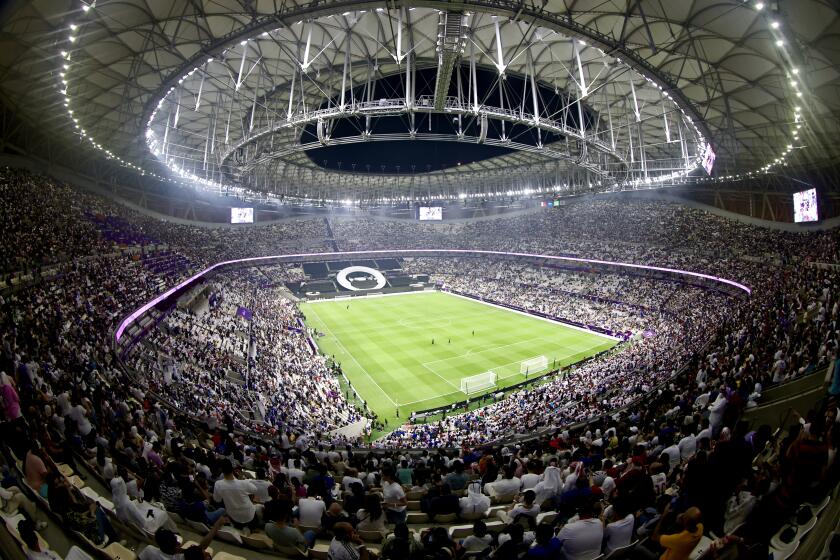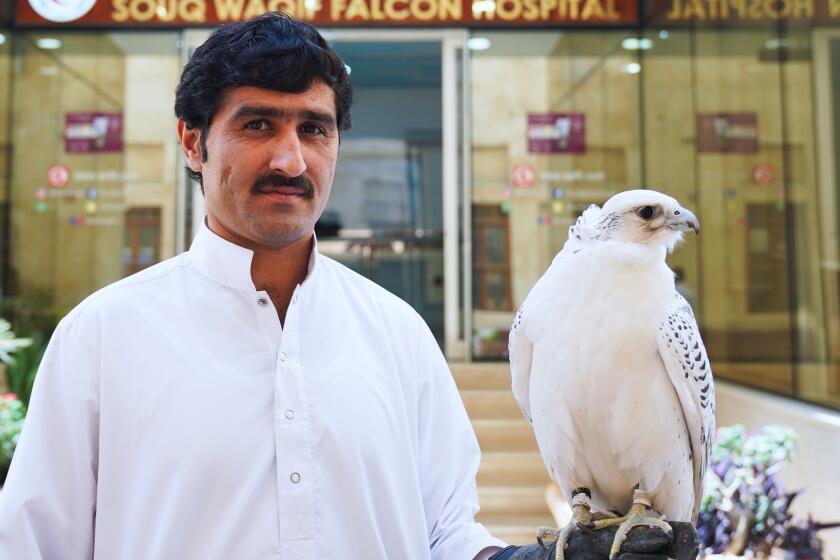Op-Ed: Put an asterisk on the Qatar World Cup
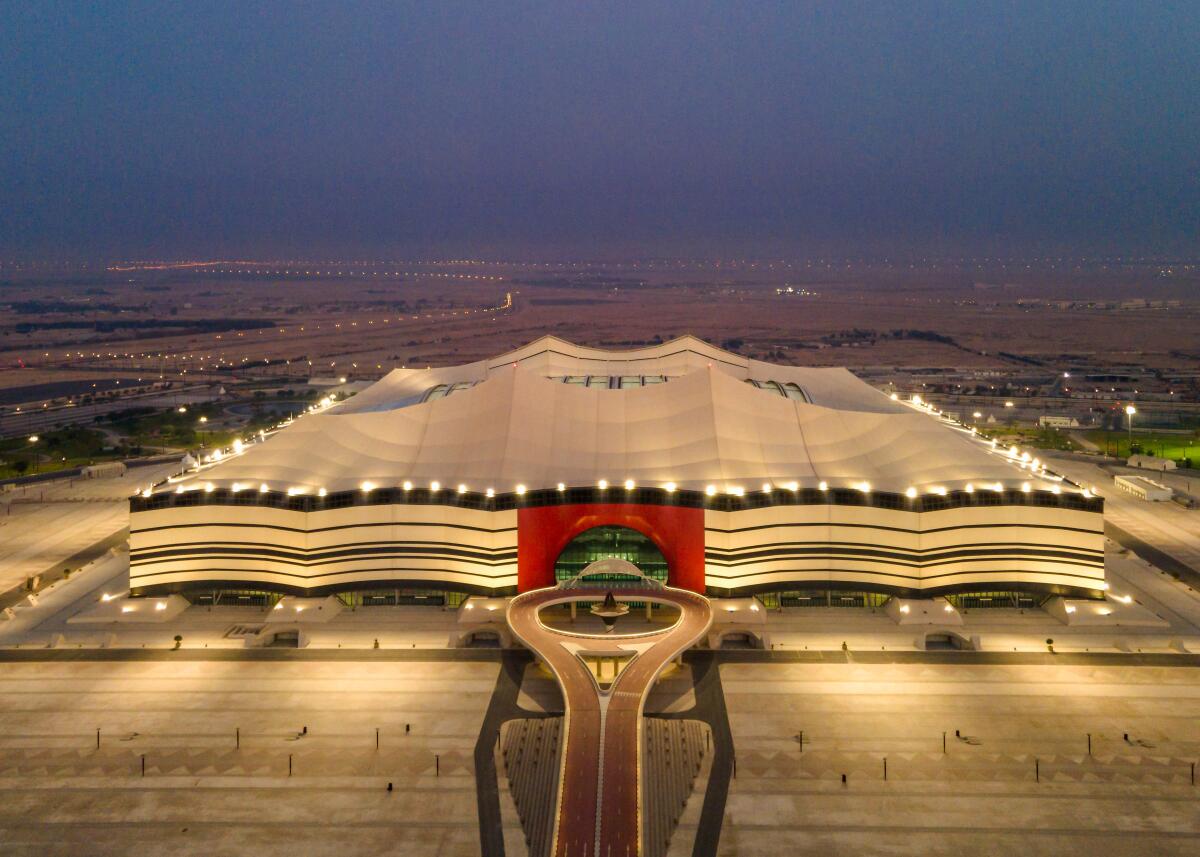
- Share via
Despite, well, a lot, FIFA is about to kick off the 2022 men’s World Cup in Qatar on Sunday.
The idea that the world’s most beloved sporting spectacle is taking place in Qatar remains as absurd today as it seemed 4,362 days ago, in 2010, when then-FIFA President Sepp Blatter pulled the country’s name out of the 2022 envelope.
Hadn’t the FIFA executive committee members heard the stirring closing arguments from three great American presidents — Bill Clinton, Barack Obama and Morgan Freeman — on behalf of the favored United States bid? Hadn’t they read FIFA’s own technical appraisals, extolling the U.S. proposal and raising red flags about what Qatar was proposing?
Saudi Arabia, Beijing and other deep-pocketed, unsavory regimes are using the games we love to launder their reputations.
For years after the choice was announced there was widespread skepticism that it would stand. Taking the World Cup to an emirate so tiny, so hot and so lacking in a soccer culture was too absurd, and thus presumably too corrupt.
Worse, its human rights record was terrible.
More than 6,000 South Asian migrant workers have reportedly died in Qatar since it won the World Cup drawing. Partly due to international pressure and outrage, the “kafala” indenture system under which migrants labored in Qatar was dismantled in 2020, and workers there have acquired more rights and a minimum wage, but their working conditions remain grim.
Qatar, moreover, criminalizes homosexuality, treats women as second-class citizens and lacks a free press.
Who is supposed to enjoy a World Cup taking place in such a country? Who would feel comfortable traveling there to watch it?
The Qataris accuse their Western critics of a double standard on human rights. They aren’t entirely wrong: Plenty of other autocratic regimes have hosted World Cups (and Olympic Games) over the past century.
For the first time, the FIFA World Cup is heading to the Middle East for a fall showcase. Here is The Times’ complete coverage of the 2022 Qatar World Cup.
The first World Cup I remember was hosted by Argentina’s military dictatorship in the middle of its “dirty war,” in which thousands were “disappeared.” And Russia and China have hosted, respectively, the most recent men’s World Cup and Winter Olympics. Those two vast countries may have less than stellar human rights records, but they also have a tradition of participating in the competitions they got to host.
There is no bright boundary designating which behavior disqualifies countries from hosting global sporting events, especially if we want the list to be more inclusive than “enlightened” Western democracies. And timing matters. Clearly Vladimir Putin put Russia over the line in February when he invaded Ukraine, but it’s less clear that Russia should have been deemed unfit in 2010 to host the 2018 World Cup.
What makes Qatar’s World Cup bid singularly cynical is how little — beyond deep pockets — it had to offer as an offset against its deficits.
Let’s start with geography. World Cups go to whole countries, not single cities. The Russia World Cup was played across four time zones; the 1994 U.S. men’s World Cup on both coasts and in between. When FIFA first decided to take a World Cup to Asia, in 2002, it had to be shared between Korea and Japan. This year, a “MENA” — Middle East/North Africa — World Cup that included Qatar as merely one of several venues, might have made some sense.
But Qatar is essentially a city-state. Instead of matches being played in eight different cities, Qatar’s eight stadiums for the tournament are all crammed into one metropolitan area; the farthest distance between them is 35 miles. And Qatar lacks other infrastructure; this year fans traveling to the World Cup will have to stay in neighboring countries and fly in and out on match days to root for their teams.
The eight stadiums hosting games at the 2022 World Cup in Qatar hold grim legacies because of their association with migrant worker deaths in the country.
Qatar’s climate is particularly inhospitable to the World Cup. It is so hot and humid in the summer months, the tournament had to be moved to the winter for the first time ever, wreaking havoc on domestic leagues around the world. And Qatar had never qualified to play in a World Cup when it was chosen to host the tournament.
But Qatar’s staggering fossil fuel riches still carried the day. As an exercise in national development and branding, the emirate was determined to spend whatever it took (as much as $220 billion, according to some estimates) to get to host the world for a month.
Blatter was dismayed when FIFA’s executive committee voted 14-8 for Qatar. He must have understood that such a dubious pick would invite unwelcome scrutiny and investigations, which indeed it did, revealing bribery and kickbacks and bringing down much of FIFA’s leadership in the process.
The Qatari World Cup went forward in part because the corruption at FIFA was so widespread it couldn’t be ascribed to any one World Cup site selection. Besides, Qatar’s flexing of its economic muscle on behalf of its World Cup bid wasn’t confined to wooing FIFA executive committee members.
Falcons hold a sacred place in Qatar, where they sell for hundreds of thousands of dollars and have subsidized healthcare at specialized hospitals.
Blatter and many others continue to blame French President Nicolas Sarkozy, who allegedly convinced Michel Platini, the head of Europe’s football federation, to throw his weight behind the Qatari bid at a much-scrutinized lunch Sarkozy hosted at the Élysée Palace for Platini and Qatar’s prime minister a month before the 2010 vote. Within a few years, the Qataris spent billions on French-made aircraft and invested in French soccer, acquiring the Paris Saint-Germain club and TV rights for the French domestic league.
Whatever the machinations that got the tournament to Qatar, once it begins, it will almost certainly be an exhilarating spectacle cherished by billions around the globe. World Cups always are.
Current FIFA President Gianni Infantino sent a letter to all national federations earlier this month exhorting them to set politics aside and just focus on the football (where have we heard that before?), but we can expect some John Carlos and Tommie Smith moments. The Australian national team released a video expressing solidarity with Qatari workers, the Danes will protest with muted uniform designs, and national captains including England’s Harry Kane may wear rainbow-colored arm bands.
In the end, we should attach an asterisk to this World Cup, but that is unlikely to trouble Qatar or FIFA. With the games being played in the emirate, and all of us watching, they have already won.
Andrés Martinez is a professor of practice in journalism at Arizona State University and a research scholar at ASU’s Global Sport Institute.
More to Read
A cure for the common opinion
Get thought-provoking perspectives with our weekly newsletter.
You may occasionally receive promotional content from the Los Angeles Times.
